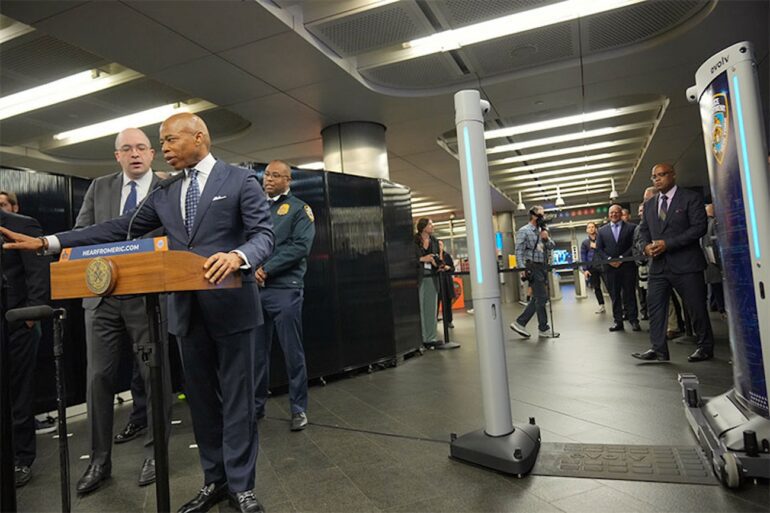- New York City will test AI gun detection technology at subway turnstiles.
- Partnership with Evolv, a weapons detection company, amidst scrutiny over machine accuracy and legal issues.
- The pilot program will commence in 90 days, adhering to transparency regulations.
- Evolv scanners are already in use at various venues, but concerns have been raised over their effectiveness.
- Regulatory inquiries were initiated regarding Evolv’s operations and product efficacy.
- The mayor advocates for technology to enhance public safety despite criticism.
- Legal Aid Society cautions against flawed surveillance systems and lack of public consent.
- Mayor emphasizes the importance of addressing public perception of safety over statistical trends.
Main AI News:
In a bid to enhance subway safety, New York City is set to embark on a groundbreaking trial of artificial intelligence-powered gun detection technology at subway turnstiles. Mayor Eric Adams revealed this initiative on Thursday, just a week following a distressing incident at a Brooklyn subway station where a passenger was shot with his own firearm during an altercation.
The city has forged a partnership with Evolv, a prominent Massachusetts-based weapons detection firm renowned for its deployment of detectors in educational institutions and entertainment venues nationwide. However, Evolv has encountered scrutiny regarding the precision of its machines, alongside facing two governmental investigations and a class-action lawsuit from shareholders.
Scheduled to commence in 90 days, in compliance with the POST Act mandating transparency in the employment of surveillance technologies, this pilot endeavor underscores the city’s commitment to scrutinizing and evaluating potential vendors during this waiting period. Mayor Adams emphasized the city’s openness to exploring innovative technologies, asserting, “This city has a technology mayor. Bring us your technologies. Let us test it.”
Mayor Adams did not disclose details regarding the specific locations and quantity of scanners to be deployed. Notably, Evolv scanners are already operational at prominent venues such as Citi Field, Lincoln Center, and the Metropolitan Museum of Art. Mayor Adams had previously installed an Evolv scanner outside City Hall in 2022 following a shooting incident in a Brooklyn subway car. Moreover, in the same year, the city conducted a similar pilot at a Bronx hospital in response to a shooting incident in the emergency room waiting area. Numerous school districts across the nation have also embraced Evolv scanners in endeavors to forestall campus shootings.
Despite resembling traditional metal detectors, Evolv’s scanners boast AI integration. The company asserts that its scanners utilize “safe, ultra-low-frequency electromagnetic fields and advanced sensors to detect concealed weapons.” CEO Peter George claims the scanners are adept at identifying a wide array of threats, including various firearms and explosives.
However, there have been reports questioning the efficacy of Evolv’s technology. Incidents have been documented where Evolv scanners flagged innocuous items like umbrellas as firearms while failing to detect modified tubes resembling gun barrels. The Intercept highlighted instances where the scanners failed to identify knives in students’ backpacks or erroneously identified harmless lunchboxes as potential bombs.
Moreover, concerns have been raised about the independence and integrity of testing conducted by Evolv. Reports indicate that Evolv funded testing by the National Center for Spectator Sports Safety and Security, subsequently editing the purportedly independent report to omit information unfavorable to its products.
In light of these developments, regulatory bodies have initiated inquiries into Evolv’s operations. The Federal Trade Commission and the Securities and Exchange Commission have launched investigations into the veracity of Evolv’s AI detection system, while investors have filed a lawsuit alleging misrepresentation of product efficacy.
Despite these challenges, Mayor Adams continues to advocate for Evolv as the preferred vendor, citing the imperative of leveraging technology to enhance public safety. However, this initiative has not been without its detractors. The Legal Aid Society cautioned against the pitfalls of flawed gun detection systems and emphasized the importance of obtaining public consent before subjecting citizens to experimental surveillance measures.
Mayor Adams acknowledged the relatively low incidence of violent crime, including gun-related incidents, within the subway system. However, he underscored the paramount importance of addressing public perceptions of safety, highlighting the disconnect between statistical trends and public sentiment. “Stats don’t matter if people don’t believe they’re in a safe environment,” Mayor Adams remarked, underscoring the urgency of restoring public trust in the subway’s security apparatus.
Conclusion:
The implementation of AI gun detection technology in the NYC subway system represents a significant step towards enhancing public safety. However, amidst scrutiny over the technology’s efficacy and legal issues surrounding the vendor, Evolv, there are challenges to be addressed. Regulatory inquiries into Evolv’s operations highlight concerns within the market regarding transparency and product reliability. Despite these challenges, the commitment of city authorities to leverage innovative solutions underscores opportunities for technology providers to meet evolving security needs.

